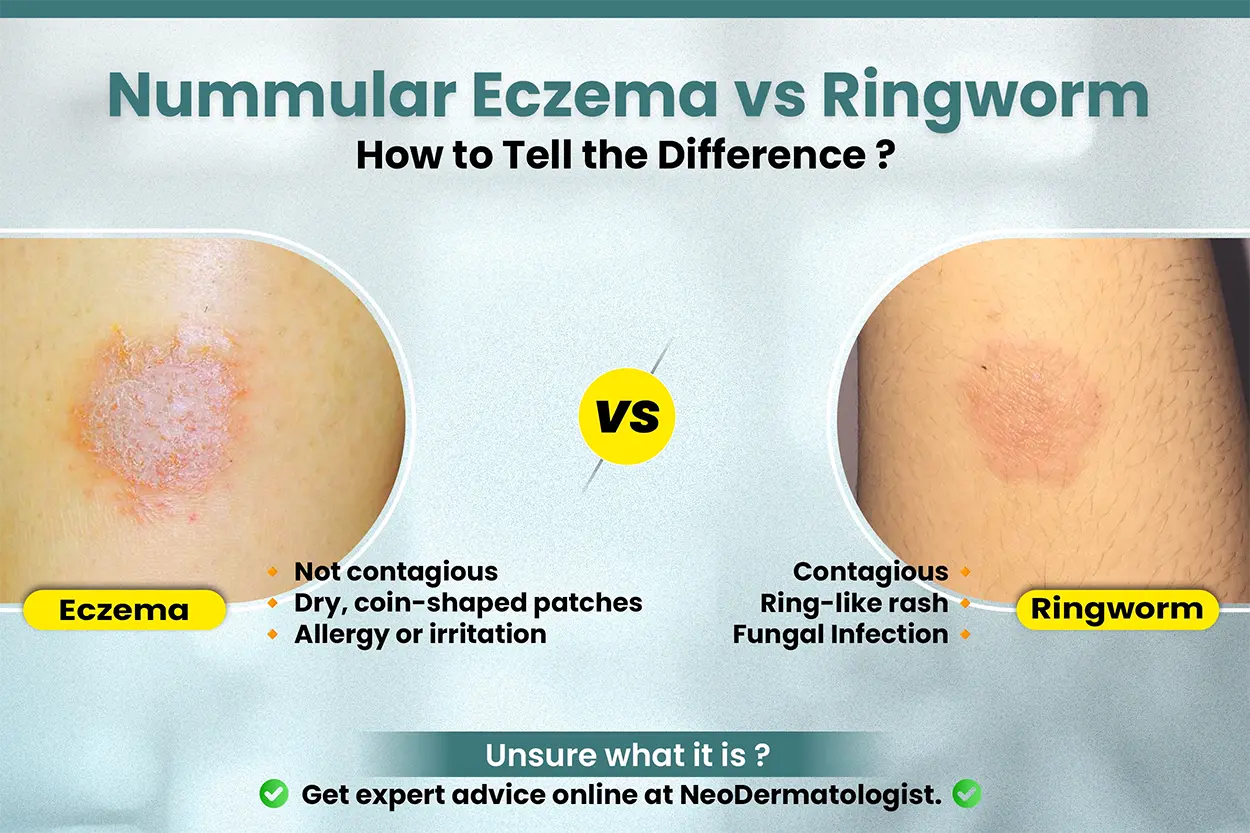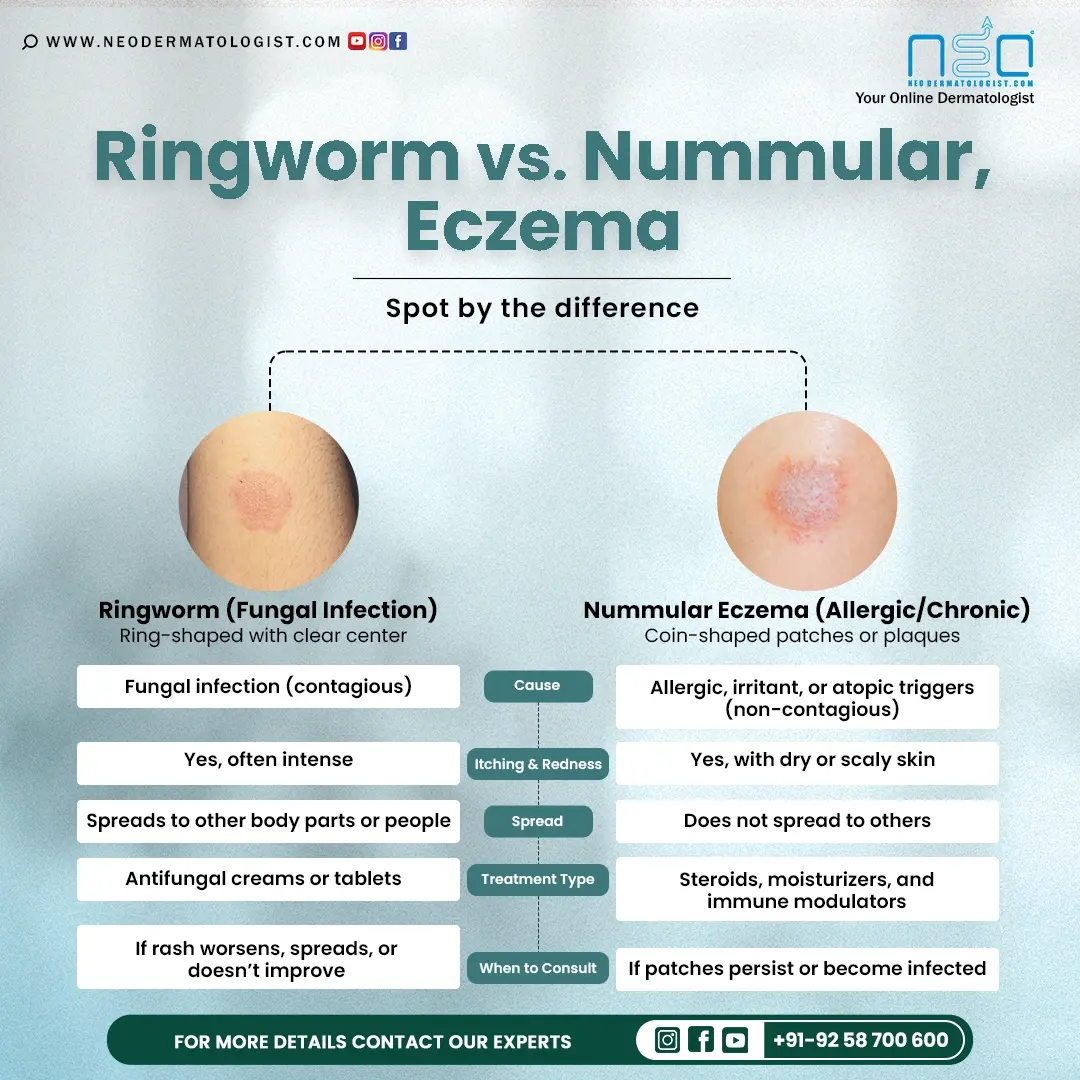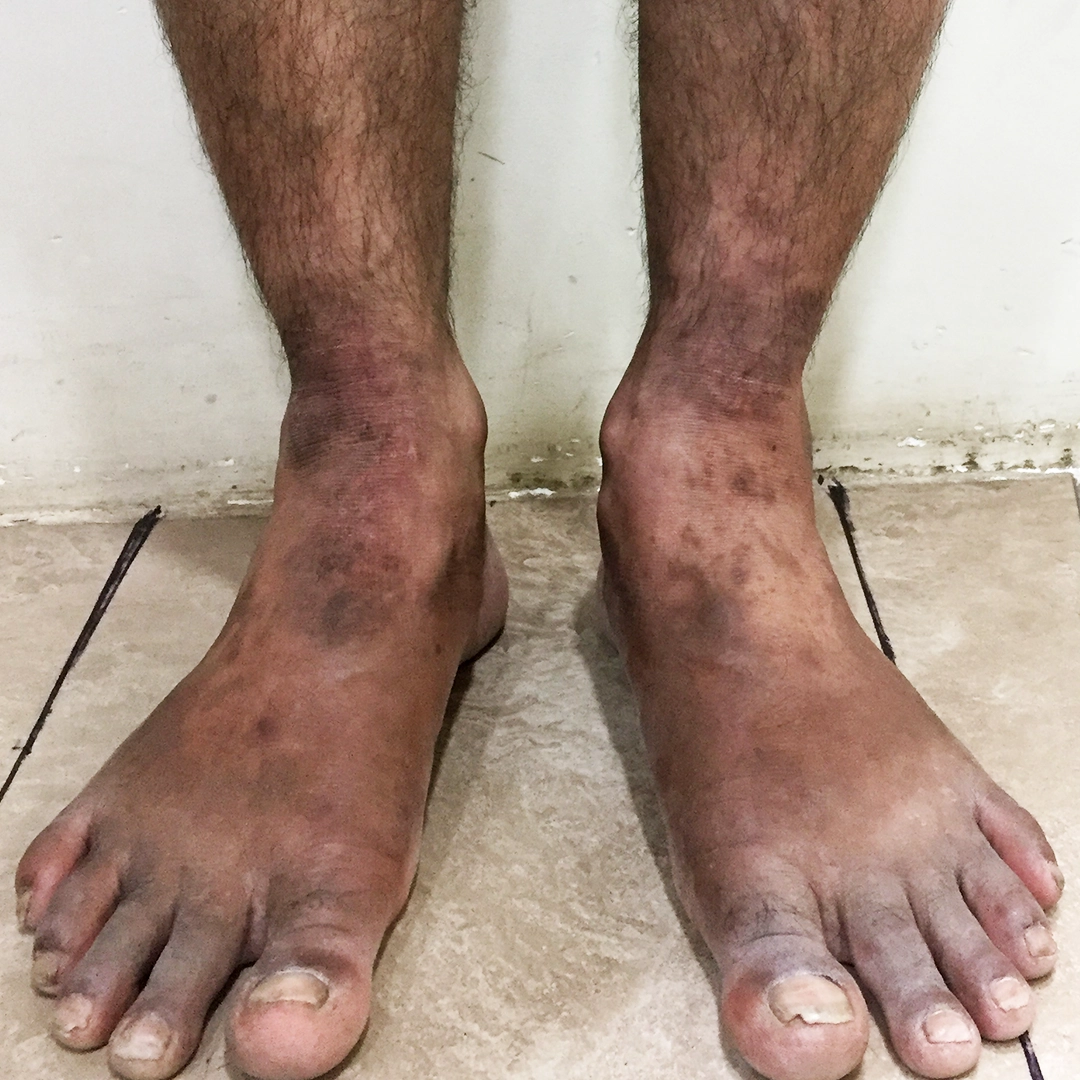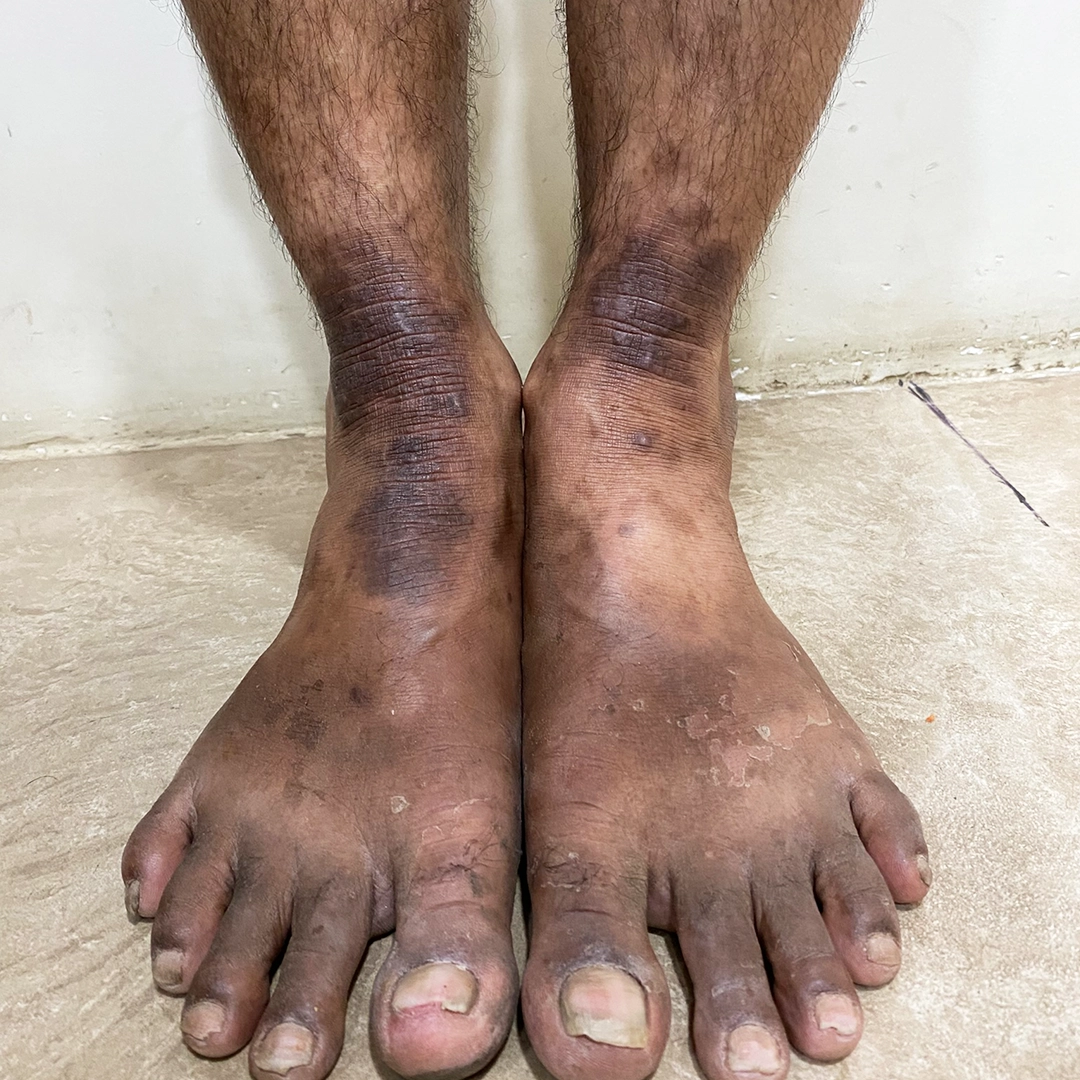
Nummular Eczema vs Ringworm: How to Identify and Treat Nummular Eczema Correctly
Introduction
Nummular eczema and ringworm are NOT the same skin condition, although they often look similar at first glance. Both can cause round, red, itchy patches on the skin, which is why many patients confuse the two and end up using the wrong treatment.
Many people searching for nummular eczema vs ringworm are actually looking for the right treatment for nummular eczema, especially when antifungal creams don’t work. Treating eczema like a fungal infection can worsen dryness, itching, and recurrence.
I’m Dr. Karma Patel, a dermatologist specializing in tele-dermatology, and during online consultations, one of the most common questions I hear is:
“Is ringworm and eczema the same?”
The short answer is no.
- Ringworm is a fungal infection that spreads and requires antifungal treatment.
- Nummular eczema is a chronic inflammatory skin condition, not caused by fungus, and needs a completely different treatment approach.
This confusion is especially common when patients notice coin-shaped, itchy, red patches on the arms, legs, or torso. Because both conditions appear similar, self-treatment without proper diagnosis can worsen symptoms, delay healing, and cause recurrence.
In this guide, we clearly explain the difference between nummular eczema vs ringworm, including:
- Key causes and triggers
- Visual and symptom-based differences
- How dermatologists diagnose each condition
- The right treatment options for faster relief and long-term control
By the end of this article, you’ll know how to identify whether your rash is eczema or ringworm and when to consult a dermatologist online for accurate diagnosis and treatment.
Nummular Eczema
Nummular eczema, an endogenous type of eczema, also known as discoid eczema, is a type of skin condition characterized by single or multiple coin-shaped erythematous patches or plaques on the skin. These patches or plaques can be dry, scaly, and itchy, and may ooze or crust over. Nummular eczema can appear anywhere on the body, but it's most common on the arms, legs, and torso. The skin lesions of nummular eczema are frequently colonised by Staphylococcus aureus.
Causes of Nummular Eczema
Nummular eczema is often caused by a combination of factors, including:
- As a manifestation of ICD (Irritant Contact Dermatitis), ACD (Allergic Contact Dermatitis), or Atopic dermatitis
- Allergies
- Skin injuries
- Insect bites
- Certain medications
- Emotional stress
Symptoms of Nummular Eczema
The symptoms of nummular eczema can vary from person to person, but common signs include:
- Coin-shaped patches or plaques on the skin
- Dry, scaly skin
- Itching and redness
- Oozing or crusting
Want to dive deeper into what causes eczema and how to manage it effectively? Check out our detailed blog post: Understanding Eczema: Causes, Symptoms, and Treatment Approaches
Treatment For Nummular Eczema
Treatment for nummular eczema focuses on reducing inflammation, relieving itching, restoring the skin barrier, and preventing flare-ups. Since this condition is not caused by a fungal infection, antifungal creams are usually ineffective unless a secondary infection is present.
Dermatologists commonly recommend a combination of the following treatments:
- Topical corticosteroids (potent or super-potent) to control inflammation, redness, and thickened eczema plaques during active flares
- Topical immunomodulators to regulate the immune response and help maintain long-term disease control, especially in sensitive areas
- Intensive moisturizers and emollients to repair the skin barrier, reduce dryness, and prevent recurrence
- Oral corticosteroids in severe or treatment-resistant cases, used for short durations under medical supervision
- Oral antihistamines to reduce itching and improve sleep quality
- Antibiotics, when signs of secondary bacterial (staphylococcal) infection such as oozing, crusting, or increased redness are present
- Early diagnosis and dermatologist-guided treatment are essential to prevent chronic flare-ups and mismanagement, especially when nummular eczema is confused with ringworm.
Dermatologist-Verified Answer: Nummular eczema is treated with anti-inflammatory therapy, not antifungal creams. If a round rash does not improve with antifungals within 7–10 days, eczema should be suspected.
Ringworm
Ringworm, also known as tinea, is a fungal infection that affects the skin. It's characterized by a ring-shaped rash that's usually itchy and red. Ringworm can appear anywhere on the body, but it's most common on the scalp, feet, and groin.
Causes of Ringworm
Ringworm is a fungal infection caused by a fungi, which can be spread through:
- Direct contact with an infected person or animal
- Contaminated objects or surfaces
- Poor hygiene
If you want to explore the causes of ringworm in more detail, check out our in-depth blog post: Learn What Ringworm Is Caused By: Causes, Prevention & Dermatologist Treatment
Symptoms of Ringworm
The symptoms of ringworm can vary depending on the location and severity of the infection. Common signs include:
- Ring-shaped rash
- Itching and redness
- Scaling and crusting
- Hair loss (if the infection is on the scalp)
Treatment of Ringworm
Treatment for ringworm typically involves antifungal medications, which can be applied topically or taken orally. Some common ringworm treatments include:
- Topical antifungal creams or ointments such as ketoconazole, amorolfine, and oxiconazole.
- Oral antifungal medications such as itraconazole, fluconazole, and terbinafine.
- Keeping the affected area clean and dry.
For a detailed guide on tablets, creams & expert treatments for ringworm, see the blog post - Best Medicine for Ringworm Infection: Tablets, Creams & Expert Treatment Guide by Dr. Ruchir Shah
Now that we’ve clearly understood the difference between eczema and ringworm, especially in terms of their distinct causes, symptoms, and treatment options, it's easier to identify which condition you might be dealing with. In some cases, people confuse nummular eczema vs ringworm (fungal infection) due to their similar appearance, but the two require very different treatments. People also looking for the Ringworm eczema, though not a medical term, is often used when fungal infections mimic eczema-like patches. That’s why knowing the ringworm and eczema difference is essential. Proper diagnosis helps ensure you follow the correct eczema and ringworm treatment path and avoid complications that may arise from misidentification.

Let’s now explore three crucial insights that will help you better manage your skin condition: why ringworm is often mistaken for eczema, the risks of using the wrong treatment, and key tips for preventing recurrence.
Why Ringworm Is Often Mistaken for Eczema
Ringworm and eczema often look similar in early stages, especially when there's redness, itching, or scaling. Many people misdiagnose a fungal infection as eczema and apply steroid creams, which may temporarily reduce redness but worsen the infection over time. This confusion delays correct treatment and can lead to spreading. Recognizing the subtle differences and avoiding self-medication is crucial.
Risks of Using the Wrong Treatment
Using antifungal creams on nummular eczema or steroids on ringworm can not only be ineffective but also harmful. Choosing the correct treatment for nummular eczema and treatment for ringworm is essential for safe and effective recovery. For example, applying steroids to ringworm may cause a condition called tinea incognito, where the infection becomes less visible but more aggressive beneath the surface. Similarly, skipping moisturizers in eczema can lead to dryness, cracking, and secondary infections. Always consult a dermatologist before starting treatment.
Tips for Preventing Recurrence
Both conditions, though different in origin, require consistent care to prevent recurrence. For eczema, keeping the skin moisturized, avoiding triggers, and following a gentle skincare routine is key. For ringworm, maintaining hygiene, avoiding sharing personal items, and treating infected pets (if any) are essential steps. Following through on treatment even after symptoms fade reduces the chance of flare-ups or reinfection.
Key Differences
While both nummular eczema and ringworm can cause skin lesions and rashes, there are some key differences between the two conditions. Nummular eczema is typically characterized by coin-shaped patches or plaques, while ringworm is marked by a ring-shaped rash with central clearance. Additionally, nummular eczema is often caused by a combination of factors and basically is an allergic reaction, while ringworm is an infection caused by fungi. Ringworm is contagious in nature and can spread to the other parts of the body of the infected person as well as can infect other people who come in contact, while nummular eczema is non-contagious and does not spread to other parts of the body and to other people. Lesions of ringworm can get bigger in size as infection spreads while it is less likely with the lesions of nummular eczema.
- The rash isn’t improving with basic creams
- Patches are spreading quickly or becoming inflamed
- You have a history of recurring fungal infections or eczema
- The itching is severe and affecting your sleep or comfort
- You're unsure whether it’s a fungal infection or eczema flare-up
- Online Hair Loss Treatment
- Acne Treatment Online
- General Skin Consultation
- Inner Part Itching Treatment
MD (Dermatology) | Registration No.: G-53014
A dermatologist specializing in online consultations for skin, hair, and nail concerns. Offers expert care for acne, pigmentation, eczema, scabies, ringworm, scalp infections, dandruff, psoriasis, vitiligo, hives, and hair loss, providing effective, personalized treatment solutions from the comfort of home.
 Hin
Hin En
En






















Comments
prapti Desai
I've been struggling with eczema, and I'm quite concerned about how to manage it for the long term. Do you have any advice on daily routines or how to avoid flare-ups? Also, can online dermatology consultations provide personalized and safe support?
सीमा वर्मा
बहुत ही जानकारीपूर्ण लेख! अक्सर लोग न्युम्युलर एक्जिमा और दाद के लक्षणों को एक जैसा समझ लेते हैं, जिससे इलाज में देरी हो जाती है। इस ब्लॉग में आपने दोनों के बीच का अंतर बहुत अच्छे से समझाया है। अब मुझे स्पष्ट समझ आ गया कि न्युम्युलर एक्जिमा और दाद में अंतर क्या है और कब डॉक्टर से संपर्क करना चाहिए। धन्यवाद!
Post a comment